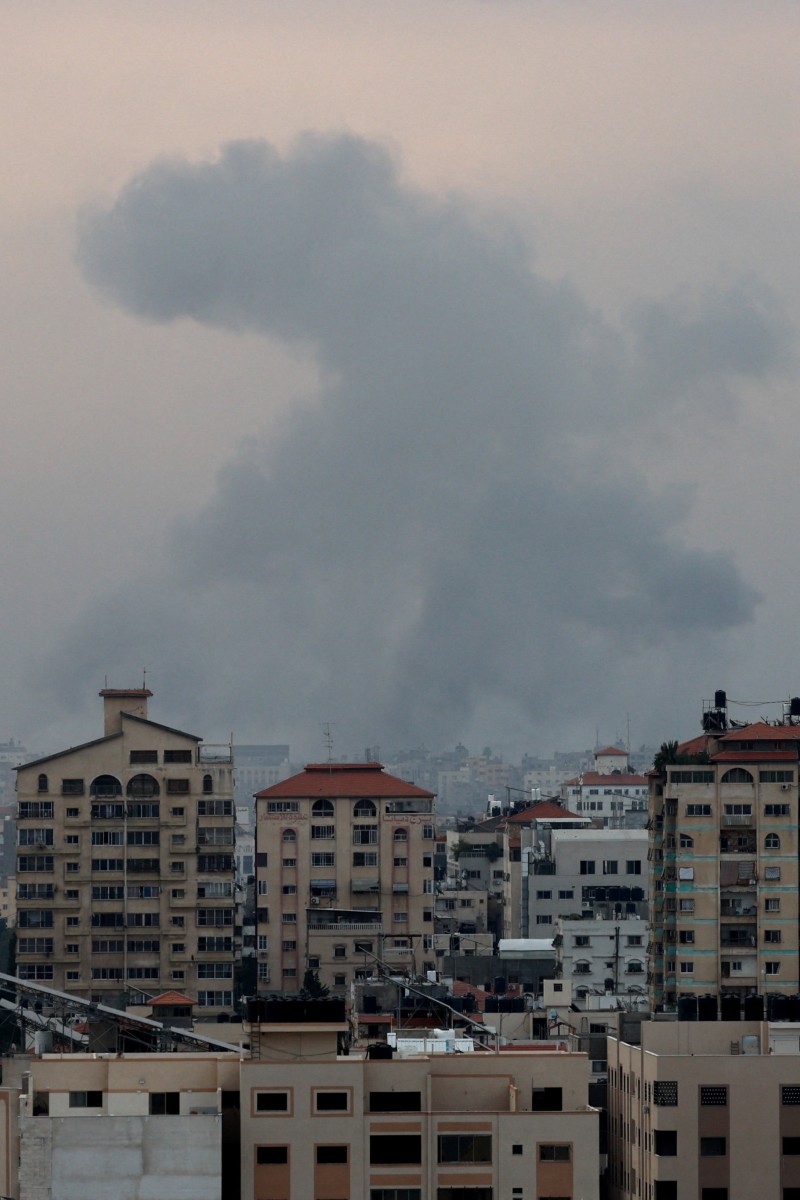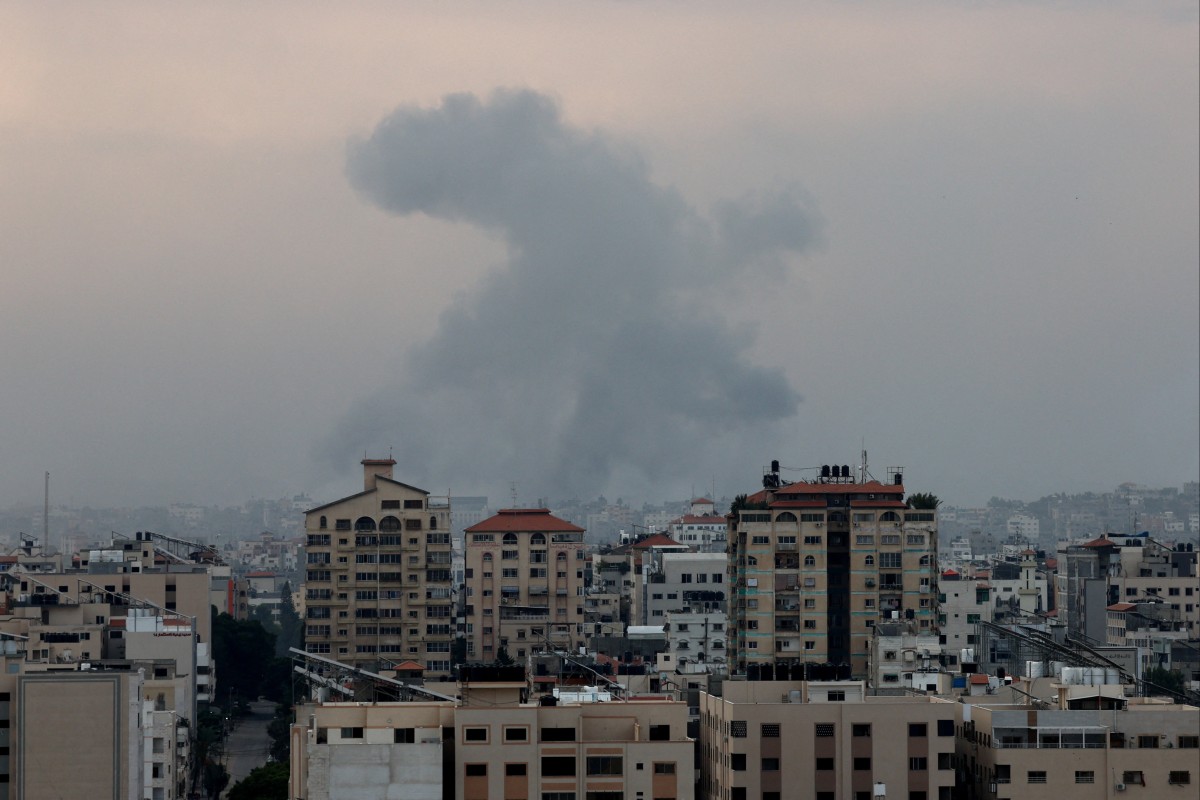
- Israel’s main military spokesman called the attack, which killed at least 700 Israelis and abducted dozens, as ‘the worst massacre of innocent civilians in Israel’s history’
- Officials in Palestine say nearly 370 killed in territory so far, including three-month-old twins
 Israel struck the Gaza strip after Hamas’ unprecedented attack on Israel. Photo: Reuters
Israel struck the Gaza strip after Hamas’ unprecedented attack on Israel. Photo: ReutersFollowing Hamas’ unprecedented attack into Israel, the Gaza Strip has been hit by the deadliest day in 15 years. Air strikes by Israel killed almost 300 Palestinians in 24 hours, as per Palestinian officials.
The dead include three-month-old twins killed with their mother and three sisters in an air strike on Saturday in Khan Younis in the southern Gaza Strip, family members said.
At least 10 people were killed in that strike, which destroyed four houses. Rescuers were still trying to find survivors in the rubble on Sunday.
Israel’s main military spokesman called the attack by Hamas fighters, who killed at least 700 Israelis and abducted dozens, as “the worst massacre of innocent civilians in Israel’s history” and the response has been correspondingly harsh.
The Health Ministry in the Hamas-controlled Gaza Strip has reported 370 Palestinians killed so far, and another 2,200 wounded, with nearly 300 killed on Saturday, the largest number of Palestinians killed in Gaza by Israeli attacks in a single day since 2008.
Israeli Prime Minister Benjamin Netanyahu vowed to exact “mighty vengeance for this wicked day”.
Medical journals warn of growing nuclear weapon threat
In Gaza, Sabreen Abu Daqqa, who was dug from the rubble of the houses struck in Khan Younis, woke up in hospital to learn three of her children had been killed, two of them had been wounded, and the fate of a sixth was unclear.
“Everything collapsed on top of us. My children were around me,” she said, her voice weak as she spoke from hospital. She called out for her children from under the rubble, but heard no reply. “They began to remove the rubble off me little by little. It took them three hours,” she said.
Israeli air strikes on Gaza began soon after the Hamas attack and continued overnight and into Sunday, destroying the group’s offices and training camps, along with houses and other buildings.
Abu Daqqa and residents of three other homes destroyed in the air strikes said they had received no forewarning from Israel, saying this was different from previous rounds of bombardment during which Israeli security forces had called residents telling them to evacuate in advance of an attack.
The Israeli military, which regularly accuses Hamas of deliberately operating in residential and other civilian buildings, declined to comment.
Stuck in Here: Instagram page features photos from Ukrainian youth showing daily life under war
Air strikes
The Israeli army has said its fighter jets have destroyed 800 militant targets so far in the Gaza Strip. Salama Marouf, head of the Hamas government media office, rejected this as a “cover to justify the occupation’s aggression against civilian people and property.”
In Rafah city, near the Egyptian border, an Israeli air strike killed 12 members of the Abu Qouta family, relatives said. Seven other family members were believed to be under the rubble, they added.
Home to some two million people, the Gaza Strip has been run by Hamas since it seized control of the territory in 2007. Its economy has long been choked by a blockade imposed by Israel with Egypt’s help.
As air strikes began on Saturday, thousands of Palestinians living near the frontier with Israel fled their homes.
UNRWA, the UN agency that provides essential services to Palestinians, said at least 20,000 Palestinians were taking shelter at 44 of the schools it operates in the Gaza Strip.
Ukraine children with disabilities struggle for therapy abroad after fleeing war
In a statement, UNRWA said two boys, both students at UN-run schools in Khan Younis and Beit Hanoun, were confirmed to be among those killed. Three UNRWA schools suffered “collateral damages” caused by Israeli air strikes, it added.
Eid Al-Attar, a teacher, raced to an UNRWA school with his five children and wheelchair-bound brother as Israeli air strikes hit near their houses in the northern Gaza Strip town of Beit Lahiya. “We lived through five wars since 2008, each has been harsher more difficult than the other,” he said.
Ashraf Al-Qidra, the spokesman of the Gaza Health Ministry, said hospitals had been overwhelmed and were depending on worn-out generators for electricity after Israel cut the 120 megawatts it supplies to the Gaza Strip on Saturday.
Israeli Energy Minister Israel Katz said on Saturday Israel would cut off the power supply to the Gaza Strip, declaring “what has been up until now will no longer be,” signalling Israel views the attack as a complete game changer.